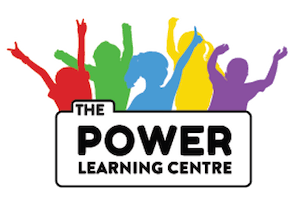Occupational Therapy
Occupational therapy can help improve childs’ cognitive, physical and motor skills and build their self-esteem and sense of accomplishment.
Occupational therapy (OT) is a subspeciality of health care that empowers children of all ages who have physical, sensory, or cognitive difficulties. OT can assist them in regaining independence in every aspect of their lives. Occupational therapists assist with obstacles that disrupt an individual’s social, emotional, and functional needs.
We administer standardised tests like BOT-2 that measure fine and gross motor proficiency, with subtests that focus on stability, mobility, strength, coordination, and object manipulation. The test is tailored to school-aged children and young adults among the ages of 4-21 years, who have varying motor control abilities ranging from normal to mild or moderate and SPM (Sensory Processing Measure) which is the measure of function in the visual, auditory, tactile, olfactory, gustatory, proprioceptive (body awareness), and vestibular (balance and motion) sensory systems, as well as praxis and social participation.
We ensure children reach their full potential!
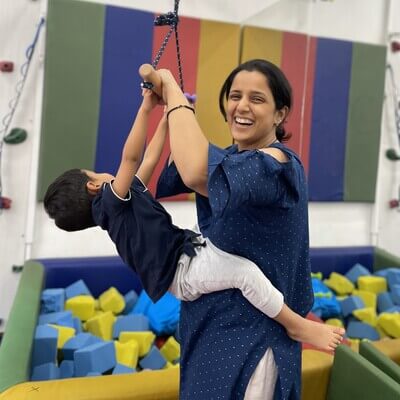
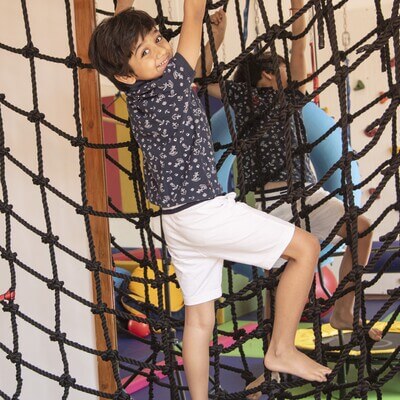
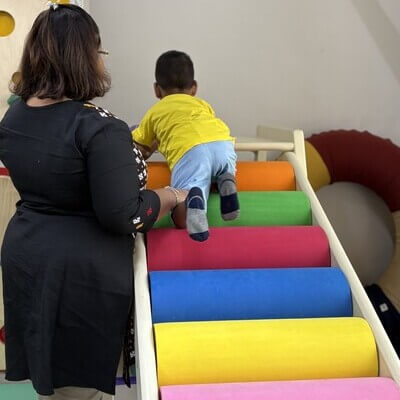
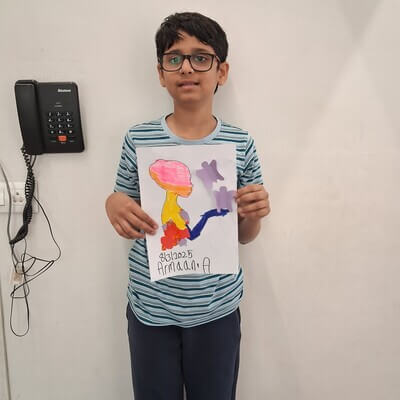
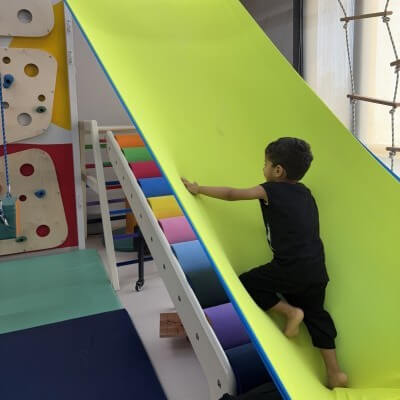
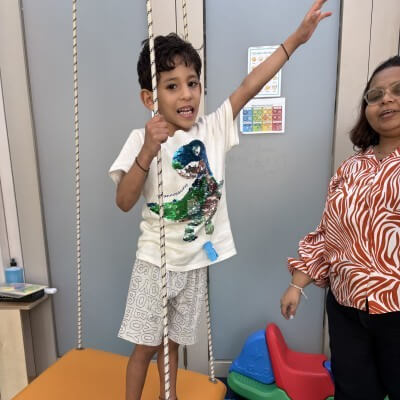
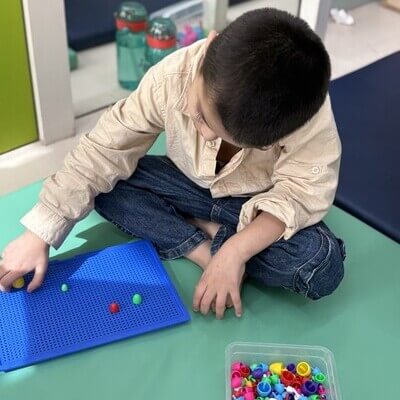
Frequently Asked Questions
What is Occupational Therapy (OT)?
OT helps children develop skills they need for daily living, playing, and learning.
Why might my child need OT?
Children might need OT for various reasons, including sensory processing difficulties, fine motor skill challenges, gross motor skill delays, or difficulty with self-care tasks.
What types of activities are involved in OT sessions?
OT activities can range from obstacle courses and swing activities to fine motor tasks like puzzles and handwriting. Activities are tailored to each child’s specific needs and goals.
My child has trouble paying attention in school. Can OT help?
OT can address attention and focus issues through sensory regulation activities and strategies to improve sitting tolerance and task completion.
My child has meltdowns and behavioral challenges. How can OT help?
OT can address underlying sensory processing issues and help develop strategies for emotional regulation and coping with challenging situations.
How will I know how my child is progressing?
Therapists provide assessment reports, progress notes, and school reports to document your child’s progress.
What is an OT Progress Note?
An OT progress note documents a child’s progress in therapy over a period of time, including improvements in specific skills and ongoing goals.
What is an OT Assessment Report?
An OT assessment report summarizes the findings of an initial evaluation and outlines recommendations for therapy.
Can I be involved in my child's therapy?
Parental involvement is often encouraged in OT. You may be asked to provide information about your child’s history and concerns, and you may also be given home activities to support your child’s progress.
What is the difference between OT Assessment Report and OT Progress Report?
OT Assessment Report is conducted at the beginning of the therapy based on the child’s current skills and any areas of concern, whereas OT Progress Report provides regular updates on the child’s progress during therapy sessions.
How often will my child have OT sessions?
The frequency and duration of OT sessions will vary depending on the child’s individual needs and goals. Some children may attend sessions multiple times per week, while others may attend less frequently.
Do Occupational Therapy services include Feeding Therapy?
Yes, Occupational Therapy services can include Feeding Therapy if it is determined to be a needed service for your child.
See what our clients says!
Indrani M.
The warm, playful and attractive environs of Power Learning is gradually turning out to be an invaluable part of Kia's support system. Snehal (her OTist) is an energetic, knowledgeable and highly personable individual, who works very closely with me to model a streamlined and comprehensive sensory approach for my child. Kia loves her!
Meghna (her Speech and Language therapist) is talented and superbly dynamic in her methodology. She is professional and confident in her field, very warm and loving with my daughter and uses fun and innovative approaches to address Kia's functional language requirements.
BIG love and thanks to Anisha and Dev, for having such a lovely niche in Bombay for our special little angels.
Jaanya B.
Ishana comes home everyday telling me stories about how fun it is to be at Power Learning.
Ms Parul & Ms Swati
I'm very much aware of the effort you put into each child. Thank you for going above and beyond for Ishana and being such a caring Teacher to her.
Ms Arpita & Ms Minali
Your play based learning approach is Amazing! Thank you for instilling love of learning into my child. It has a pleasure watching her enjoying every bit of her class.
Ms Maitri
Teachers require so many positive qualities like Care, Compassion, Patience and Commitment. You have all the qualities in Abundance. Thank you for all you do!
Ms Anisha
It's great to see how visible and accessible you are around Power Learning! You are always available for discussions with us at all times. Coming to Mumbai from Indonesia was not easy until I found Power learning Center, Truly appreciate your Guidance and Love.. keep up the good work and I hope to see a marked improvement in my child very soonThank you! Thank you! Thank you!!🙏♥️
Yogita M.
For me, Power Learning is a One Stop Solution! Equipped with state of art facilities and excellent therapists this centre has it all under one roof.
Snehal ( OTist) and Meghna ( Language therapist ) have both used tailor made strategies to work on my daughter’s needs. Moreover , both ensure that i am kept informed on the road map for my child and also follow a similar approach at home.
Although, this is just the beginning and consistency is the key , I can certainly say that 3 weeks of intensive therapy has shown noteworthy positive changes in my daughter such as increased focus / attention span , improvement in expressive language and social skills.
Big Thank You to the dynamic team of specialists at Power Learning . Special thanks to Parul , Anisha & Dev.
- Juhu
3rd Floor, Film Industry Welfare Trust Building, Next to Ajivasan Hall, Juhu Tara Road, Mumbai – 49.
- Goregaon
APML Towers, 5th Floor, 53/1 Vishweshwar Nagar Road, Opp. Pravasi Industrial Estate, Goregaon (East), Mumbai- 63.
- +91 90040 53414
- +91 85915 72877
- anisha@powerlearning.app
- parulm@powerlearning.app
